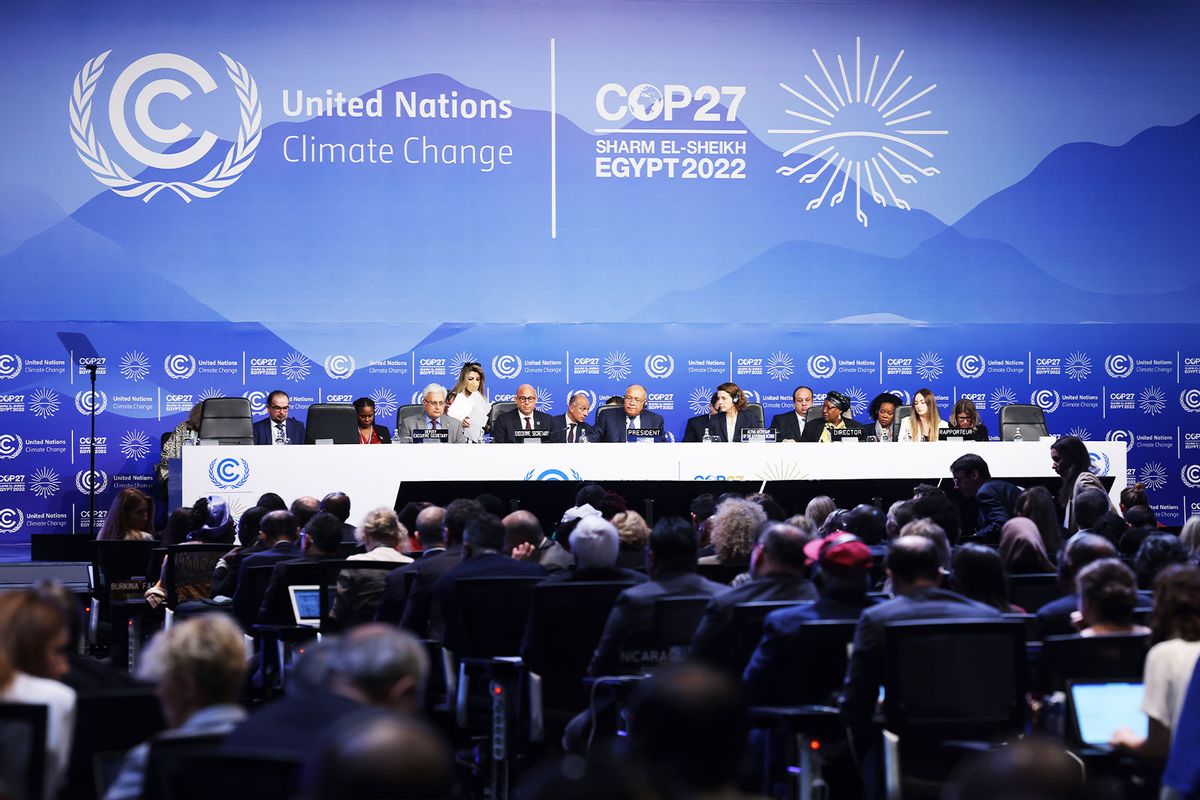Tensions at the United Nations climate change conference known as COP27 have been running high, largely over the issue of what's called "loss and damage" — shorthand for the disproportionate suffering that the developing world is already experiencing at the hands of climate change. In the most concrete response yet to the issue, on Monday a group of countries led by Germany announced their commitment to developing "a Global Shield against Climate Risks" to help people in the least developed countries better prepare for climate-fueled disasters.
The Global Shield is a joint initiative by the G7, a political forum consisting of the world's most industrialized countries, and the V20, which is represented by the finance ministers of 58 of the countries most vulnerable to climate change. The German government has committed roughly $175 million to the effort, which intends to address loss and damage through insurance programs and social security schemes. Denmark, Ireland, Canada, and France have also contributed about $42 million to the initiative.
The least-industrialized countries in the world have argued that they've done little to cause climate change but are the most affected by climate-fueled disasters, like the recent floods in Pakistan that left a third of the country underwater. (The V20's website points out that it represents nearly 20 percent of the global population but only 5 percent of global emissions.) For this reason, developing countries have called on wealthy nations to set up a fund to pay for the loss and damage climate change has already caused and will cause in the future — in effect, for a form of climate reparations. The success of COP27 could rest on whether wealthy nations, whose early industrialization is disproportionately responsible for the climate change that has occurred so far, answer the call.
"The Global Shield is long overdue," Ken Ofori-Atta, Ghana's finance minister, said at the press conference announcing the Global Shield's launch at COP27 in Sharm el-Sheikh, Egypt. "It has never been a question of who pays for loss and damage, because we in the V20 are already paying for it."
Given the lack of momentum on direct funding to address loss and damage, the Global Shield is the first systematic and substantive effort by wealthy nations that responds to the call for climate reparations. While proposals for a separate, formal U.N. mechanism that would provide direct loss and damage funding are still under negotiation, some countries such as Ireland, Austria, and New Zealand have made symbolic pledges of a few million dollars to show their support for the cause. The United States, which has historically refused to acknowledge the issue, has staunchly opposed a separate fund for loss and damage. On Saturday, U.S. climate envoy John Kerry said that a financing mechanism for loss and damage is "just not happening." However, the U.S. is a member of the G7 and hence a part of the Global Shield consortium.
While there are few details yet on exactly how the Global Shield will work, German federal development minister Svenja Schulze said the program will include insurance programs, social security schemes, early warning systems, and other financial assistance arranged in advance before disaster strikes. Bangladesh, Costa Rica, Fiji, Ghana, Pakistan, the Philippines, and Senegal will be the first recipients of "Global Shield packages," according to a press release.
Advocates for loss and damage warned that insurance schemes like those promised by Global Shield are an insufficient solution to loss and damage, and they worried that such programs will distract from the demand for separate direct funding. The Global Shield is an expansion of the InsuResilience Global Partnership, a program spearheaded in 2015 by the German government that primarily provides insurance schemes to countries in the Global South.
InsuResilience and other insurance programs that have been championed by wealthy nations have been inadequate to meet the scale of loss and damage that people in climate-vulnerable countries are facing, advocates told Grist. Asking people in the developing world to pay for insurance when they've done little to cause the climate crisis is fundamentally unfair, they said.
"If you're a rich country who is on the hook for paying for this, it very cleverly redirects the responsibility for dealing with climate loss and damage onto vulnerable people," said Julie-Anne Richards, an independent consultant and expert with the Loss and Damage Collaboration, an advocacy group. "Rich countries can turn around and go, 'Well, the problem is you didn't prepare well enough. You don't have insurance.'"
Harjeet Singh, head of global political strategy at the Climate Action Network, an international coalition of more than 1,800 environmental groups, said that in past years wealthy nations have used insurance programs to distract from the demand for direct loss and damage funding. He is wary of the announcement, given the lack of more concrete detail about how the Global Shield, which was earlier floated in June at the G7 leaders summit, will deliver financial support to those in need.
"The phrase is very fancy: 'Global Shield,'" he said. "But what's inside is unclear to many."
Schulze was quick to address such concerns at the press conference on Monday. "It is not a kind of tactic to avoid formal negotiations on loss and damage," she said. "The Global Shield also isn't the one and only solution for loss and damage — certainly not. We need a broad range of solutions and respective funding for tackling loss and damage."
The international community has been kicking around the idea of an insurance scheme to help countries vulnerable to climate change since at least the early 1990s, when island nations proposed an insurance pool to protect low-lying countries from sea level rise. Over the years, the World Bank, United Nations, and various countries have created risk pooling programs such as the Caribbean Catastrophe Risk Insurance Facility, the African Risk Capacity, and the Pacific Catastrophe Risk Assessment and Financing Initiative. These programs are subsidized by wealthy nations and other donors and allow countries in the Caribbean, Africa, and the Pacific to secure coverage for disasters such as drought, flooding, and hurricanes.
These sorts of insurance can be purchased by governments to protect their people against disasters, and by individuals to protect their property. Premiums are typically subsidized to make them affordable. There are two main types of climate disaster insurance: indemnity insurance and parametric insurance. The former involves purchasing policies that cover specific perils over specific periods of time and are paid out depending on the scale of losses when a disaster strikes. These are similar to the insurance policies purchased by U.S. homeowners.
In the case of parametric insurance, on the other hand, insurers identify specific climatic conditions that trigger payouts to policyholders. When specific predetermined thresholds describing the level of flooding or drought or other disasters are met, insurers disburse funds no matter the scale of the damage on the ground. The upshot of this is that the long and cumbersome process of filing a claim and verifying the damage is avoided, resulting in quicker payouts. But in countries in the Global South, where historical climatic and environmental data isn't as readily available, insurers have struggled to define the best parameters — such as wind speed, rainfall, or days without rain — that trigger payouts. As a result, even when an expensive climate-driven disaster strikes, insurers sometimes don't pay because the parametric thresholds weren't met.
For example, the government of Malawi paid $4.7 million for drought insurance through the African Risk Capacity for the 2015-2016 agricultural season. But when erratic rains resulted in a prolonged drought and more than $350 million in damages, the insurance program found that the thresholds for the number of people affected by the drought were not met, and that it didn't trigger a payout. After sustained media coverage and outrage over the decision, the African Risk Capacity eventually reassessed its modeling and provided $8.1 million in payouts — a small fraction of the need. Similarly, after Hurricanes Irma and Maria made landfall on Antigua and Barbuda in 2017 and caused $136 million in economic damage, the Caribbean Catastrophe Risk Insurance Facility paid out $6.8 million — 5 percent of the damages.
One research paper that studied the African, Caribbean, and Pacific insurance programs concluded that while "to some extent it is possible to address the weaknesses of parametric risk pooling schemes, it seems equally clear that it is impossible to fully remedy them."
According to InsuResilience's annual report, it has "enabled access to financial protection for over 350 million people in vulnerable countries," but it's unclear how the program is counting those who are protected and whether payouts after disasters have met their needs. Singh, the advocate with the Climate Action Network, said the program counts an entire family as protected if one member has insurance for even one of a slew of climate perils.
"The starting point has to be whether people who are being affected are getting adequate support or not," said Singh. "If they're not getting it, then whatever we have is inadequate."
In an emailed statement in response to questions about InsuResilience's effectiveness, a spokesperson for the German Federal Ministry for Economic Cooperation and Development confirmed that the number of policyholders is multiplied by the average household number to calculate beneficiaries. The spokesperson defended the estimate saying that InsuResilience "sets strong qualitative standards" and that the program "ensure[s] that products are indeed fit for purpose to provide effective protection for an entire household."
Even those working with InsuResilience have been quick to acknowledge its shortcomings. Colin McQuistan, the head of climate resilience at Practical Action, a charity in the U.K., has been helping develop a pilot program in Nepal to insure farmers against flooding in partnership with InsuResilience. The program only protects paddy farmers during the monsoon season, even though rice is just one of multiple crops that farmers in the region cultivate.
"Attempting to suggest that the insurance product is protecting those farmers is ridiculous, because it's pretty clear it's only protecting that one crop to that one hazard," said McQuistan.
Currently, just 10 percent of the program's budget can be used to subsidize the insurance premium, but McQuistan hopes that in future years additional government subsidies will lower the cost further. Securing useful climate data for the region has also been a challenge, McQuistan added. The group used rainfall and river flow data for the Karnali River to develop the product, but recently some of the farmers were affected by floods from another nearby river.
"There's still a lot of work needed to develop the thresholds and triggers for a parametric insurance product in rivers where we don't have sufficient historical data," he said.
Aside from overcoming such technical challenges, the Global Shield's success will depend on the amount of money that it is able to raise from wealthy nations and other donors. At the press conference, Schulze said the $175 million pledged by Germany was "just a start, a sort of seed money" and that the initiative will "need substantial additional funding over time."
At a separate press conference, Rachel Cleetus, a policy director at the nonprofit Union of Concerned Scientists, said that the scale of funding for the Global Shield "is completely off."
"Countries are putting money in the millions and the needs, they have admitted, are rising into the billions and trillions," she said. "[The Global Shield] is not a substitute for a loss and damage finance facility."


Shares